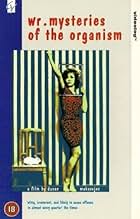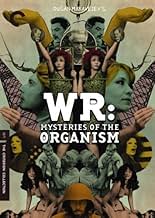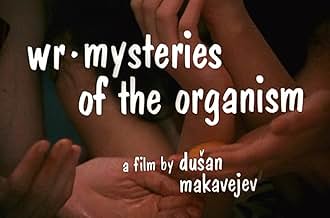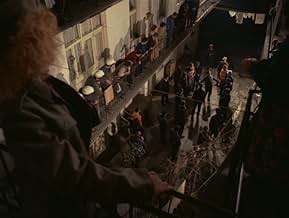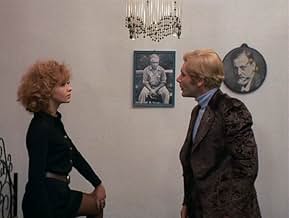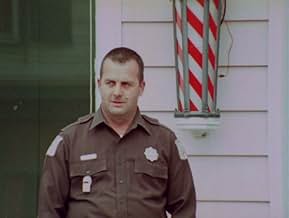AVALIAÇÃO DA IMDb
6,6/10
5,7 mil
SUA AVALIAÇÃO
Adicionar um enredo no seu idiomaAn homage to the work of psychologist Wilhelm Reich, matched with a story about a Yugoslavian girl's affair with a Russian skater.An homage to the work of psychologist Wilhelm Reich, matched with a story about a Yugoslavian girl's affair with a Russian skater.An homage to the work of psychologist Wilhelm Reich, matched with a story about a Yugoslavian girl's affair with a Russian skater.
- Prêmios
- 3 vitórias no total
Mikheil Gelovani
- Joseph Stalin
- (cenas de arquivo)
Zedong Mao
- Self
- (cenas de arquivo)
- (as Mao Zedong)
Wilhelm Reich
- Self
- (cenas de arquivo)
David Henry Bradley Jr.
- Self
- (não creditado)
Avaliações em destaque
I have been trying to see this for many years, particularly after I discovered Reich in my reading in the early 80's, read some of his writings as well as a great biography "Fury on Earth". Now our library has it on a new video release, and I have to say it was worth the wait. It is a masterpiece of documentary insight into its subject Wilhelm Reich, of subversive cinema in that it has a great power to undermine the beliefs of the viewers/participators, and of classical comedy and drama as embodied (literally) in the "fictional movie" within the documentary. Occasionally punctuated by the wild and crazy NY poet/musician Tuli Kupferberg roaming the streets of Manhattan in full battle array and carrying an M-16 (I don't think they could get away with that these days, unless they had a Mr. De Niro in the cast.) Yes, it is blatant hippie/yippie revolutionary zeitgeist of 1968-1971, which was very much fueled by the father of the sexual revolution, Dr. Reich, who had died in 1957 in jail for not answering a subpoena to defend his claims of cancer cures. He said he would be judged by scientists but not by lawyers. Inasmuch as he was the only individual to have his books burned by both Hitler and the US government (FDA), his story and his philosophy should be more widely known, but of course he is still suppressed by some of the powers that be. The erotic content of "WR" is tame in the face of today's hardcore but all the more effective for it, in that Reich condemned pornography but glorified healthy sexuality above all else. And for those "doves" that still populate the earth by the millions or billions, the words and deeds of the good Dr. Reich, who was exiled by Hitler and then Stalin (who is shown in this documentary in some amazing pseudo-heroic films he had made of himself,) still resonate. As do the words of Tuli Kupferberg and his band The Fugs, on the soundtrack: "Kill, kill, kill for peace...Near or far or very middle East..."
I saw this originally at a showing at the British Film Institute years ago and it blew my mind. Every film student should see it. A subversive mix of politics and sex, it shows just how boring and middle class Monty Python, the Farrelly Brothers, et al really are. A non sequitur to the 9th degree, it shows the power that cinema can have on an audience. Considering the age of this film, it is incredible how outrageous it is. Once you've seen it, you will never forget it. It is truly a land mark film in the realm of the surreal. A must viewing for everyone.
Directed by Serbian filmmaker Dusan Makavejev (also known for directing 'Sweet Movie', and the Australian produced 'The Coca-cola Kid'), the film mixes documentary and narrative cinema, to comment on the infiltration of Soviet Communism, sexual politics/sexual revolution, in a political satire. The main drive of the film to begin with is the work of Austrian-American psychiatrist and psychoanalyst, Dr Wilhelm Reich: His theories of Organon therapy (use of static electricity), and the connection between neuroses in people that is rooted in physical, sexual and social surroundings. This connects also with the work of Alexander Lowen, an American psychotherapist (and student of Reich's), who practices and teaches Bioenergetic analysis which uses therapeutic body work to associate the mind with the body, and in theory release repressed energy through the body sexually without the act of physical sex. I observed in these sequences a kind of connection to the work of Arthur Janov, and his primal scream therapy.
The narrative section of the film tells the story of Milena (Milena Dravic) and her sexually promiscuous flatmate Jagoda (Jagoda Kaloper), and their theories and speeches of sexual revolution: "The October revolution was ruined when socialism rejected free love". They meet a Russian communist figure skater, Ivica (Vladimir Ilivich), who they seduce. But Milena soon discovers that communism has no time for sexuality unless it is first met with physical violence. This seems to be a metaphor for the struggle against Stalinist communism within Yugoslavia since the second world war. But in the film Ivica seems somewhat deluded by the concept of communism (as he states, "communism is a Latin word meaning communal), whilst almost being made rigid by the sexual intentions of Milena.
The most interesting part of the film is the first part that focuses on the life and work of Wilhem Reich (hence the W. R. in the films title). He first started working in psychoanalysis with Sigmund Freud in the 1920's, but after writing books such as 'The Mass Psychology of Fascism', fled Austria for America, where he settled in Maine. He worked on his theories of orgone therapy, and developed the orgone accumulator, an organic box lined with lead that individuals would sit in and is theorised as giving both therapy to the bodies organs and to sexuality (The use of the orgone accumulator was even endorsed by William S. Burroughs.). Eventually Reich was arrested (more than likely the victim of situation - i.e. he was from behind the iron curtain), and viewed as insane - despite being tried in court. All of his books were burned in New York, supervised by the federal food and drugs administration agents (take from that what you will).
It is an interesting film. The different strands are connected by the theories of Wilhelm Reich. But it's one of those films that is probably more interesting to talk about than watch as it is incredibly slow moving, and at times seems to focus on activities (such as bioenergetic analysis), as group fad, and seems to almost fall into a 'new age' enlightenment message. Released in 1971, this would make sense, as the sexual revolution was in full 'swing'. Despite all of this it is a relatively enjoyable piece of cinema, with some nice ideas in it. But again, the life of W R far outshines the film as a whole.
www.the-wrath-of-blog.blogspot.com
The narrative section of the film tells the story of Milena (Milena Dravic) and her sexually promiscuous flatmate Jagoda (Jagoda Kaloper), and their theories and speeches of sexual revolution: "The October revolution was ruined when socialism rejected free love". They meet a Russian communist figure skater, Ivica (Vladimir Ilivich), who they seduce. But Milena soon discovers that communism has no time for sexuality unless it is first met with physical violence. This seems to be a metaphor for the struggle against Stalinist communism within Yugoslavia since the second world war. But in the film Ivica seems somewhat deluded by the concept of communism (as he states, "communism is a Latin word meaning communal), whilst almost being made rigid by the sexual intentions of Milena.
The most interesting part of the film is the first part that focuses on the life and work of Wilhem Reich (hence the W. R. in the films title). He first started working in psychoanalysis with Sigmund Freud in the 1920's, but after writing books such as 'The Mass Psychology of Fascism', fled Austria for America, where he settled in Maine. He worked on his theories of orgone therapy, and developed the orgone accumulator, an organic box lined with lead that individuals would sit in and is theorised as giving both therapy to the bodies organs and to sexuality (The use of the orgone accumulator was even endorsed by William S. Burroughs.). Eventually Reich was arrested (more than likely the victim of situation - i.e. he was from behind the iron curtain), and viewed as insane - despite being tried in court. All of his books were burned in New York, supervised by the federal food and drugs administration agents (take from that what you will).
It is an interesting film. The different strands are connected by the theories of Wilhelm Reich. But it's one of those films that is probably more interesting to talk about than watch as it is incredibly slow moving, and at times seems to focus on activities (such as bioenergetic analysis), as group fad, and seems to almost fall into a 'new age' enlightenment message. Released in 1971, this would make sense, as the sexual revolution was in full 'swing'. Despite all of this it is a relatively enjoyable piece of cinema, with some nice ideas in it. But again, the life of W R far outshines the film as a whole.
www.the-wrath-of-blog.blogspot.com
The film for which director Dusan Makavejev is best known. It's similar to his later Sweet Movie, which I watched last week, in that it's made up of a bunch of disparate parts edited together. The most prominent thread is a documentary about sexual psychiatrist and (pseudo-)scientist Wilhelm Reich, a refugee from Nazi Germany who fled to the United States, where he was ironically persecuted and imprisoned when the government became suspicious of his work. A second thread is fictional, set in Eastern Europe, and is about a sexually liberated woman (Milena Dravic) promoting sexual freedom in Communistic language. There are other smaller threads about Andy Warhol's transsexual protégé Jackie Curtis, a hippie with a gun who runs around New York City, a woman who makes dildos and probably a couple of other ones I'm not remembering. The film covers some interesting areas, but it's too loose and not interested enough in any of these things to engage in them. The separate bits began to fall apart, for me at least. Sweet Movie was kind of a mess, but it was a well-structured masterpiece in comparison to WR. I liked Sweet Movie a whole lot more.
10theemu
Makavejev was always one of the clowns of the Third Cinema, and WR, his masterpiece, is no exception. Makavejev interweaves fiction, documentary, and found audio and video clips (a Stalinist propaganda film, electro-shock treatment footage) to create a fantastically bizarre but intelligent discussion of both the orgone energy theory of Wilhelm Reich and the relationship between Yugoslavia and the USSR in a post-Stalinist era.
I know. It sounds tedious, but it isn't. In fact, it's really fascinating. Among the clips Makavejev (a film theoretician in his own right, WR harkens back to the pre-Stalinist era of Soviet Montage) assembles are footage of performance art by the Yippie poet/singer Tuli Kapferberg and documentary clips of Jim Buckley, an editor for Screw Magazine, getting a mold of his penis made.
WR is bizarre, dogmatic, and at times, hard to watch, but having seen it twice now, I've come to appreciate its ways. By the time Vladimir breaks into song at the film's end, you'll be smiling too.
I know. It sounds tedious, but it isn't. In fact, it's really fascinating. Among the clips Makavejev (a film theoretician in his own right, WR harkens back to the pre-Stalinist era of Soviet Montage) assembles are footage of performance art by the Yippie poet/singer Tuli Kapferberg and documentary clips of Jim Buckley, an editor for Screw Magazine, getting a mold of his penis made.
WR is bizarre, dogmatic, and at times, hard to watch, but having seen it twice now, I've come to appreciate its ways. By the time Vladimir breaks into song at the film's end, you'll be smiling too.
Você sabia?
- CuriosidadesBanned in Yugoslavia immediately after release.
- Citações
Narrator: Comrade lovers, for your health's sake, fuck freely!
- Versões alternativasAlthough this film was passed uncut for UK cinemas upon its original release, the 1995 Connoisseur Video release used an edited print which was shown on Channel 4 as part of a 1991 censorship season. This TV version used psychedelic computer generated masking techniques to hide some of the more explicit details, including genuine sex during the opening Soviet sex education film, the images on the wall paintings showing people masturbating, and all shots of Jim Buckley's penis as a plaster cast is made of it (which was obscured by digitally animated stars).
- ConexõesEdited from O Juramento (1946)
Principais escolhas
Faça login para avaliar e ver a lista de recomendações personalizadas
- How long is WR: Mysteries of the Organism?Fornecido pela Alexa
Detalhes
- Data de lançamento
- Países de origem
- Idiomas
- Também conhecido como
- WR: Mysteries of the Organism
- Locações de filme
- Rangeley, Maine, EUA(Wilhelm Reich Museum/commune and town scenes)
- Empresas de produção
- Consulte mais créditos da empresa na IMDbPro
- Tempo de duração1 hora 24 minutos
- Cor
- Mixagem de som
- Proporção
- 1.37 : 1
Contribua para esta página
Sugerir uma alteração ou adicionar conteúdo ausente

Principal brecha
By what name was W.R. - Mistérios do Organismo (1971) officially released in India in English?
Responda

